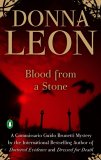Reading Guide Questions

Please be aware that this discussion guide will contain spoilers!
- What is the picture of Venice that emerges in the book? How is the story
driven by the history and geography of the city? Did you feel catapulted into
the life of the canals, even into the map of the frontispiece? How does Brunetti's
own appreciation of his city seduce the reader? See page 77: "Palazzi
swept by on both sides, the drunken promiscuity of their styles competing for
his attention."
- " 'Who'd want to kill a vu cumpra?' Rizzardi asked" (p. 11). What are
the attitudes of the citizens of Venice toward these street people? Are they
tolerated by official insouciance, a general shrug about illegal immigrants? Brunetti had assumed they functioned under the arm of organized crime. Is there
evidence of that?
- Even though we never know the name or even the proven nationality of the
murder victim, how are we led along with Brunetti to a gradual sympathy with him
and other vu cumprà trying to survive in Venice? Does the description of
the bag sellers as beautiful, tall, straight, even happy people set up the
victim as sacrificial? Do these Africans represent some simpler, golden age as
compared to the sophisticated corruption of the Italians?
- How does Brunetti's personality help him in his unorthodox investigations?
Does he ever have second thoughts about using his past and present network of
friends? When? Does his character also limit his career, especially considering
his "refusal to curry favour with the men in power" (p. 51)?
- "Was this the historian's plight, Brunetti wondered, never to know what was
true but only what made sense? Or the policeman's?" (p. 59). What is he worried
about here?
- Are there times Brunetti crosses lines of ethics, even legality? When? Does
this behavior compromise him? Or is he just a functioning pragmatist? Does there
seem to be any real way to work within the system without sabotaging it at
times? Blackmail? Evidence tampering? Give examples. Are there times, aside from
his interactions with Sandrini and the Albanian prostitute, when Brunetti is
"strangely cheered by the consideration of his own perfidy" (p. 62)?
- How does Paola serve as a bridge between the old Venice and the new one?
Would her moral distinctions, such as her outrage at Chiara, be taken as
seriously by her family and the reader if she had no aristocratic cushion? Is
she a limousine liberal or truly a person of conscience? What does she provide
for Brunetti besides access to academia? Devil's advocacy?
- How does Don Alvise's character serve as a moral touchstone (see p. 69–75)?
Are there other such touchstones for Brunetti? Does he have dependable allies
within his department?
- Brunetti, a remarkably intelligent, well-read man, is technologically inept.
What does his resistance to modernity suggest about his other talents and
values? He harkens back to the Iliad and to Roman historians. His son
gives him Pliny for Christmas. What does Brunetti glean from his readings? And
how does he recognize his need for technology?
- What is the significance of the carved (truncated) head? How does Brunetti's
academic research lead him further into the mystery? How do art, mythology, and
fetishism converge in this artifact? What happens to it?
- Black Africans are not the only group subjected to prejudice and stereotype
in the course of the novel. Who else comes under fire? How are Americans
portrayed? Who weighs in on the subject and why? What are Brunetti's own
susceptibilities to prejudice? He can assume that his daughter did not learn
dismissal of Africans at home, that it must have been "something, like head
lice, that Chiara picked up in school" (p. 30). But to what biases are he and
many other Venetians vulnerable (see pp. 30, 33, and 48)?
- At times does the police story assume a fun-house atmosphere? Sometimes katzenjammer funny (the rescue in a shallow canal) and other times insane (the
confiscation of thousands of counterfeit bags that just mushroom again the next
day)? What other examples of mayhem do you see in the police? " 'It's all crazy,
the whole thing,' said Rubini" (p. 52). Is it this particular department, made
up of 80 percent pro-government and anti-immigrant officers, that causes havoc
and engages in collusion? Donna Leon has addressed the inefficiency of the
police and emergency services in Venice in her other books. Do you think she is
commenting on a failing of the Venetian government or the impossibility of
imposing a principled order anywhere?
- What do you think the title implies? How do stones recur as a motif in the
book? Look again at Don Alvise's renunciation of his vocation on page 70.
- What is Brunetti left with as a philosophy at the end? In this world of
venality and official complicity, is he to take arms against a sea of troubles
in the only ways he knows—hard work, family, friends, and a certain generosity
of spirit? His father-in-law the Count holds him in high regard for his
dedication to work. In the face of Vianello's bleak vision of global warming,
Brunetti asks if there is really nothing they could do. Vianello replies, "Live
life and try to do our jobs, I think" (p. 81). Would you agree that good food,
wine, and love are also essential to "living life and doing our jobs"?
Unless otherwise stated, this discussion guide is reprinted with the permission of Penguin.
Any page references refer to a USA edition of the book, usually the trade paperback version, and may vary in other editions.

 Book Reviewed by:
Book Reviewed by:





